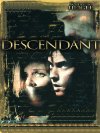
Edgar Allan Poe was an American writer, poet, editor, and literary critic who is best known for his poetry and short stories, particularly his tales involving mystery and the macabre. He is widely regarded as one of the central figures of Romanticism and Gothic fiction in the United States, and of early American literature. Poe was one of the country's first successful practitioners of the short story, and is generally considered to be the inventor of the detective fiction genre. In addition, he is credited with contributing significantly to the emergence of science fiction. He is the first well-known American writer to earn a living by writing alone, which resulted in a financially difficult life and career.

"The Black Cat" is a short story by American writer Edgar Allan Poe. It was first published in the August 19, 1843, edition of The Saturday Evening Post. In the story, an unnamed narrator has a strong affection for pets until he perversely turns to abusing them. His favorite, a pet black cat, bites him one night and the narrator punishes it by cutting its eye out and then hanging it from a tree. The home burns down but one remaining wall shows a burned outline of a cat hanging from a noose. He soon finds another black cat, similar to the first except for a white mark on its chest, but he develops a hatred for it as well. He attempts to kill the cat with an axe but his wife stops him; instead, the narrator murders his wife. He conceals the body behind a brick wall in his basement. The police soon come and, after the narrator's tapping on the wall is met with a shrieking sound, they find not only the wife's corpse but also the black cat that had been accidentally walled in with the body and alerted them with its cry.
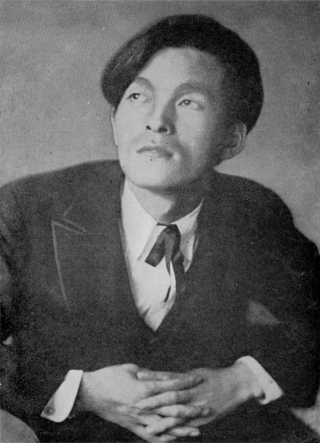
On Watanabe was a Japanese mystery writer and fantasy novelist. Despite his early death aged 27, he was an inspiration for later Japanese authors.

"The Tell-Tale Heart" is a short story by American writer Edgar Allan Poe, first published in 1843. It is told by an unnamed narrator who endeavors to convince the reader of the narrator's sanity while simultaneously describing a murder the narrator committed. The victim was an old man with a filmy pale blue "vulture-eye", as the narrator calls it. The narrator emphasizes the careful calculation of the murder, attempting the perfect crime, complete with dismembering the body in the bathtub and hiding it under the floorboards. Ultimately, the narrator's actions result in hearing a thumping sound, which the narrator interprets as the dead man's beating heart.
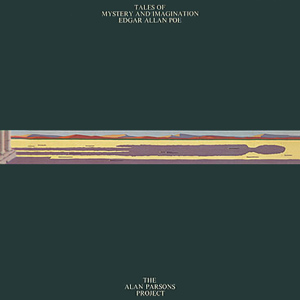
Tales of Mystery and Imagination (Edgar Allan Poe) is the debut studio album by British rock band the Alan Parsons Project. It was released on 25 June 1976 in the United Kingdom by Charisma Records and 20th Century Fox Records in the U.S. The lyrical and musical themes of the album, which are retellings of horror stories and poetry by Edgar Allan Poe, attracted a cult audience. The title of the album is taken from the title of a collection of Poe's macabre stories of the same name.
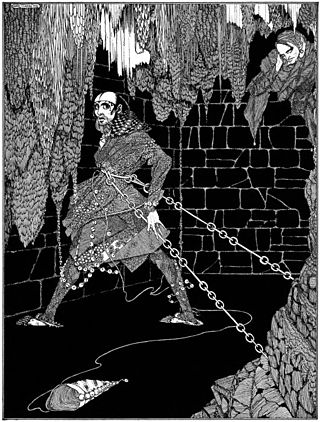
"The Cask of Amontillado" is a short story by the American writer Edgar Allan Poe, first published in the November 1846 issue of Godey's Lady's Book. The story, set in an unnamed Italian city at carnival time, is about a man taking fatal revenge on a friend who, he believes, has insulted him. Like several of Poe's stories, and in keeping with the 19th-century fascination with the subject, the narrative follows a person being buried alive – in this case, by immurement. As in "The Black Cat" and "The Tell-Tale Heart", Poe conveys the story from the murderer's perspective.

"The Fall of the House of Usher" is a short story by American writer Edgar Allan Poe, first published in 1839 in Burton's Gentleman's Magazine, then included in the collection Tales of the Grotesque and Arabesque in 1840. The short story, a work of Gothic fiction, includes themes of madness, family, isolation, and metaphysical identities.

Le ChevalierC. Auguste Dupin is a fictional character created by Edgar Allan Poe. Dupin made his first appearance in Poe's 1841 short story "The Murders in the Rue Morgue", widely considered the first detective fiction story. He reappears in "The Mystery of Marie Rogêt" (1842) and "The Purloined Letter" (1844).

Eric Norman Woolfson was a Scottish songwriter, lyricist, vocalist, executive producer, pianist, and co-creator of the band the Alan Parsons Project, who sold over 50 million albums worldwide. Woolfson also pursued a career in musical theatre.
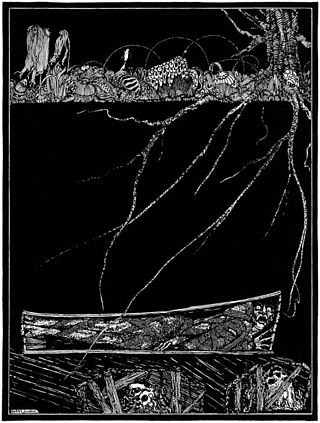
"The Premature Burial" is a horror short story by American writer Edgar Allan Poe, published in 1844 in The Philadelphia Dollar Newspaper. Its main character expresses concern about being buried alive. This fear was common in this period and Poe was taking advantage of the public interest. The story has been adapted to a film.

"Ligeia" is an early short story by American writer Edgar Allan Poe, first published in 1838. The story follows an unnamed narrator and his wife Ligeia, a beautiful and intelligent raven-haired woman. She falls ill, composes "The Conqueror Worm", and quotes lines attributed to Joseph Glanvill shortly before dying.

House of Usher is a 1960 American gothic horror film directed by Roger Corman and written by Richard Matheson from the 1839 short story "The Fall of the House of Usher" by Edgar Allan Poe. The film was the first of eight Corman/Poe feature films and stars Vincent Price, Myrna Fahey, Mark Damon and Harry Ellerbe.

The Golden Argosy: The Most Celebrated Short Stories in the English Language is an anthology edited by Charles Grayson and Van H. Cartmell, and published by Dial Press in 1955. It is famous for being the favorite book of novelist Stephen King. King, who recalls that "I first found The Golden Argosy in a Lisbon Falls (Maine) bargain barn called the Jolly White Elephant, where it was on offer for $2.25. At that time I only had four dollars, and spending over half of it on one book, even a hardcover, was a tough decision. I've never regretted it." He calls it "an amazing resource for readers and writers, a treasury in every sense of the word... The Golden Argosy taught me more about good writing than all the writing classes I've ever taken. It was the best $2.25 I ever spent."

The Haunted Palace is a 1963 horror film released by American International Pictures, starring Vincent Price, Lon Chaney Jr. and Debra Paget, in a story about a village held in the grip of a dead necromancer. Directed by Roger Corman, it is one of his series of eight films based largely on the works of American author Edgar Allan Poe.
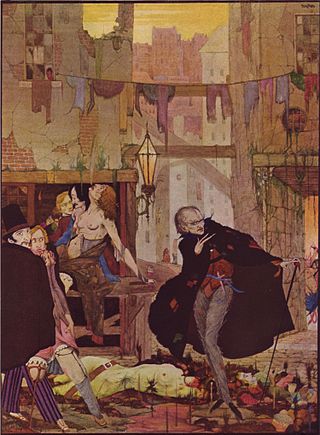
"The Man of the Crowd" is a short story by American writer Edgar Allan Poe about a nameless narrator following a man through a crowded London. It was first published in 1840.

American poet and short story writer Edgar Allan Poe has had significant influence in television and film. Many are adaptations of Poe's work, others merely reference it.

Edgar Allan Poe has appeared in popular culture as a character in books, comics, film, and other media. Besides his works, the legend of Poe himself has fascinated people for generations. His appearances in popular culture often envision him as a sort of "mad genius" or "tormented artist", exploiting his personal struggles. Many depictions of Poe interweave elements of his life with his works, in part due to Poe's frequent use of first-person narrators, suggesting an erroneous assumption that Poe and his characters are identical.
Tales of Mystery & Imagination is a popular title for posthumous compilations of writings by American author, essayist and poet Edgar Allan Poe and was the first complete collection of his works specifically restricting itself to his suspenseful and related tales.
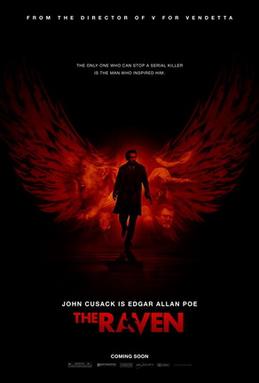
The Raven is a 2012 American crime thriller film directed by James McTeigue, produced by Marc D. Evans, Trevor Macy and Aaron Ryder and written by Ben Livingston and Hannah Shakespeare. Set in 1849, it is a fictionalized account detailing the last days of Edgar Allan Poe's life, in which the poet and author helps the police pursue a serial killer, whose murders mirror those in his stories. While the plot of the film is fictional, the writers based it on some accounts of real situations surrounding Edgar Allan Poe's mysterious death. Poe is said to have repeatedly called out the name "Reynolds" on the night before his death, though it is unclear to whom he was referring. The film stars John Cusack, Alice Eve, Brendan Gleeson and Luke Evans. Its title derives from Poe's 1845 poem "The Raven", in a similar manner to the earlier unrelated 1935 and 1963 films.

The Pale Blue Eye is a 2022 American mystery thriller film written and directed by Scott Cooper, adapted from the 2006 novel of the same name by Louis Bayard. The film features an ensemble cast that includes Christian Bale, Harry Melling, Gillian Anderson, Lucy Boynton, Charlotte Gainsbourg, Toby Jones, Harry Lawtey, Simon McBurney, Timothy Spall, and Robert Duvall. Its plot follows veteran detective Augustus Landor in 1830 West Point, New York, as he investigates a series of murders at the United States Military Academy with the aid of Edgar Allan Poe, a young military cadet.
